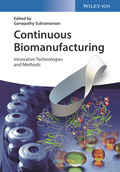Continuous Biomanufacturing
Innovative Technologies and Methods

1. Edition November 2017
628 Pages, Hardcover
218 Pictures (64 Colored Figures)
27 tables
Monograph
Short Description
Top experts from the biotech industry and academia review the technological and economic benefits to be gained from implementing continuous processes.
Buy now
Price: 199,00 €
Price incl. VAT, excl. Shipping
Euro prices for Wiley-VCH and Ernst & Sohn titles are only valid for Germany. In EU countries, local VAT applies. Postage will be charged.
This is the most comprehensive treatise of this topic available, providing invaluable information on the technological and economic benefits to be gained from implementing continuous processes in the biopharmaceutical industry.
Top experts from industry and academia cover the latest technical developments in the field, describing the use of single-use technologies alongside perfusion production platforms and downstream operations. Special emphasis is given to process control and monitoring, including such topics as 'quality by design' and automation. The book is supplemented by case studies that highlight the enormous potential of continuous manufacturing for biopharmaceutical production facilities.
2. Tools Enabling Continuous and Integrated Upstream and Downstream Processes in the Manufacturing of Biologicals
3. Engineering Challenges of Continuous Biomanufacturing Processes (CBP)
4. Progress Towards Automated Single Use Continuous Monoclonal Antibody Manufacturing via the Protein Refinery Operations Lab
5. Single-use bioreactors for continuous bioprocessing: challenges and outlook
6. Two mutually enabling trends: Continuous bioprocessing and Single-use technologies
7. Perfusion Formats and their specific medium requirements
8. Upstream Continuous Process Development
9. Study of Cells in the Steady State Growth Space
10. Continuous Downstream Processing for Production of Biotech Therapeutics
11. Evolving Needs For Viral Safety Strategies in Continuous Monoclonal Antibody Bioproduction
12. Multi-Column Continuous Chromatography ? Understanding this enabling Technology
13. Continuous Chromatography as a fully integrated process in Continuous Biomanufacturing
14. Continuous Chromatography in Biomanufacturing
15. Single Pass Tangential Flow Filtration (SPTFF) in Continuous Biomanufacturing
16. Design of Integrated Continuous Processes for high quality Biotherapeutics
17. Integration of upstream and downstream in continuous biomanufacturing
18. Quality control and regulatory aspects for continuous biomanufacturing
19. Continious Validation for Continous Processing
20. Validation, uality and Regulatory Considerations in Continuous Biomanufacturing
21. Evaluation of Continuous Downstream processing: Industrial Perspective
A chemistry graduate from Madras, India, Dr. Subramanian was awarded his doctorate from the University of Glasgow for work on natural products. His main research interests lie in the utilization of natural material separation processes and bioconversions.
Dr. Subramanian has written and edited a number of books and articles in the field of biotechnology. For the last 15 years, he has been organizing conferences promoting the integration and sharing of knowledge between academia and industry.


